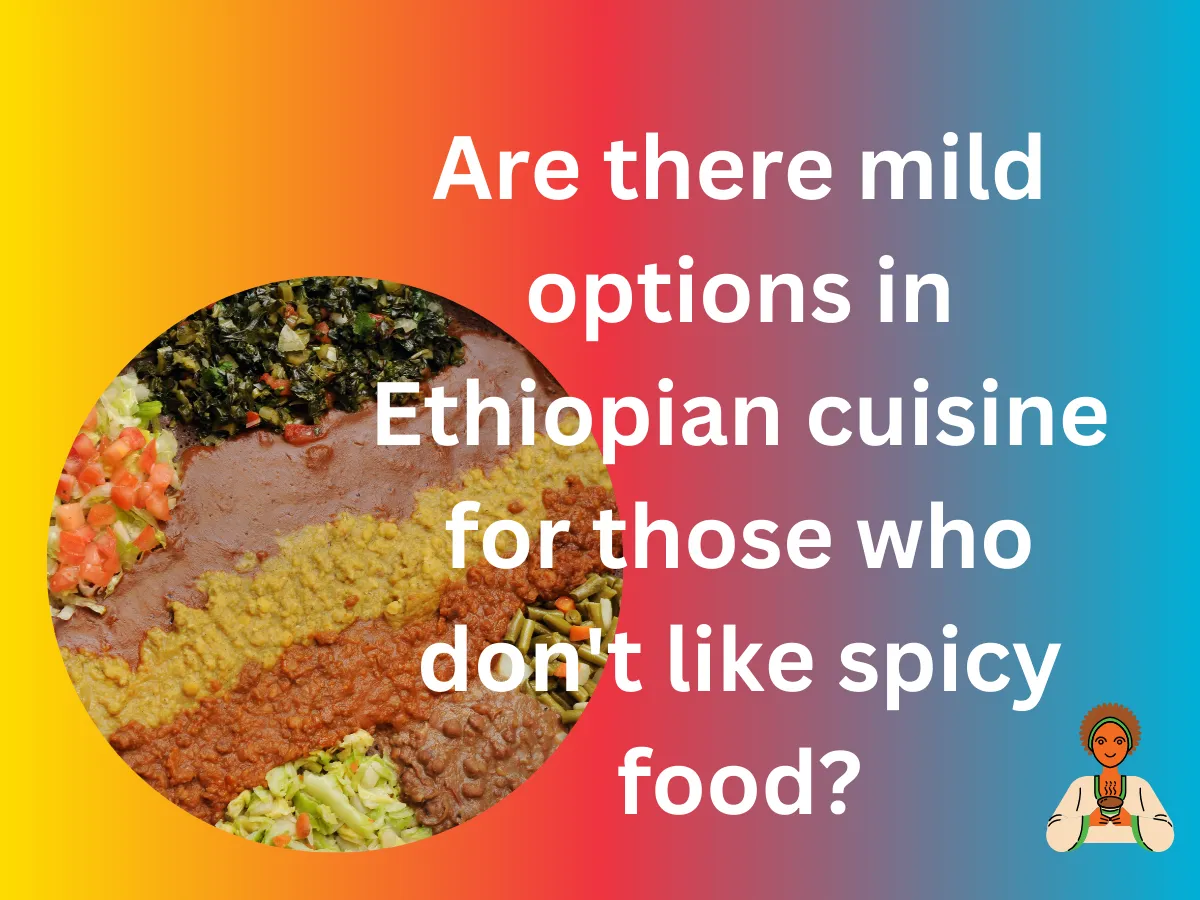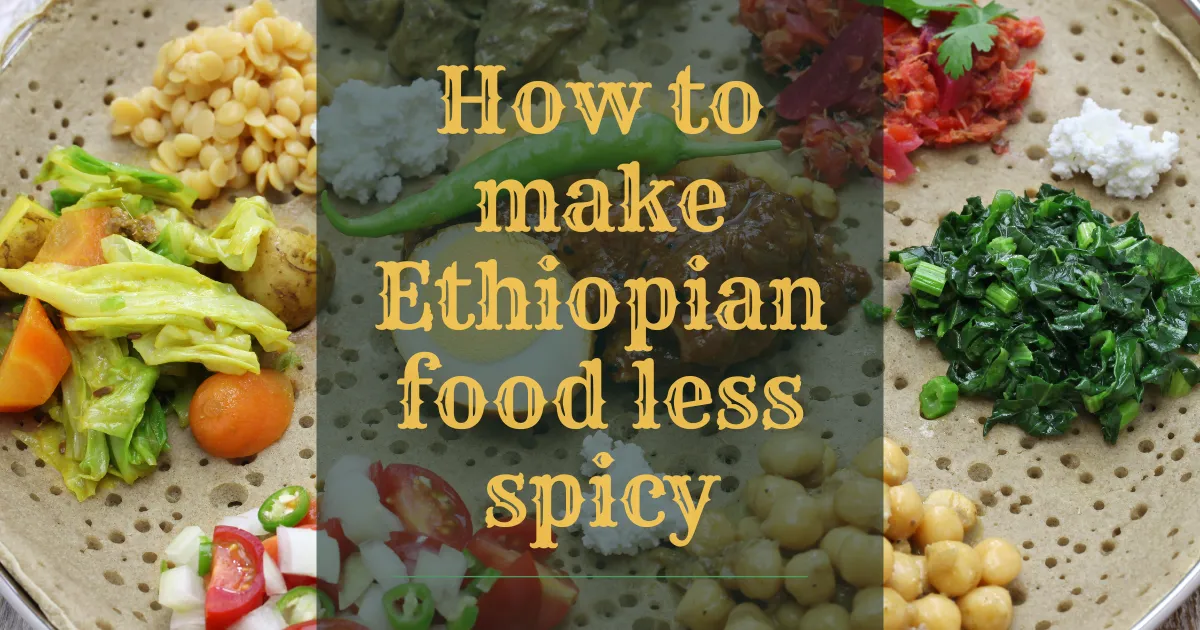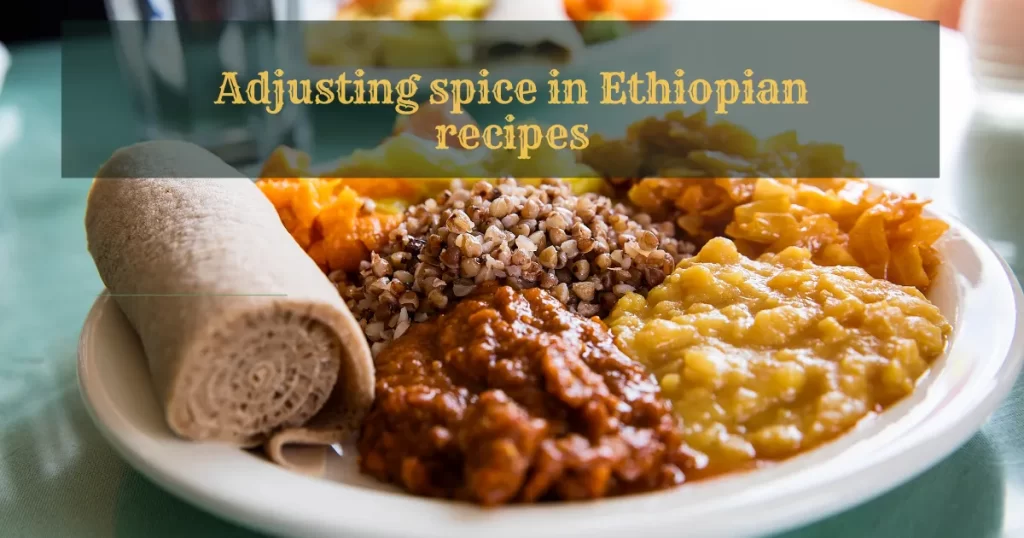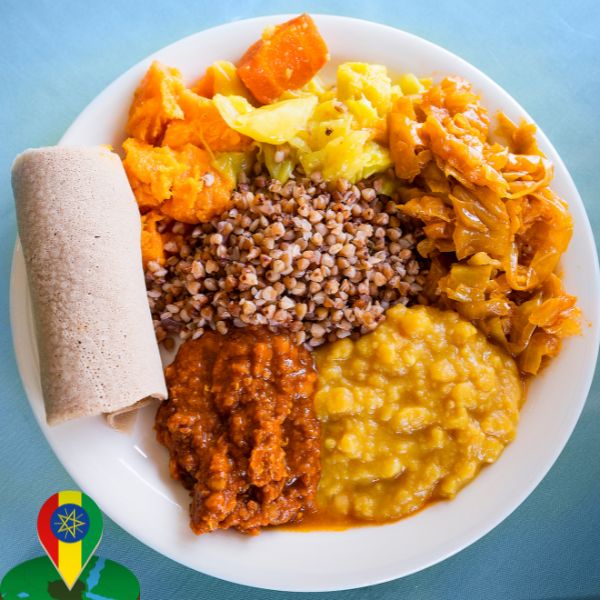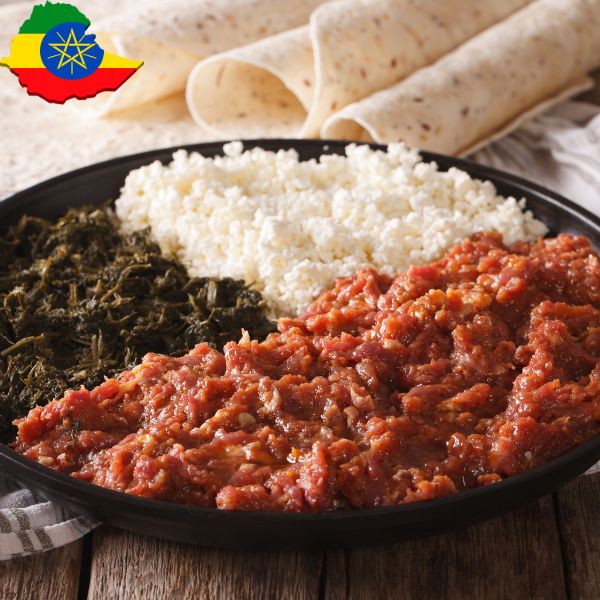Whether you’re an adventurous foodie or simply seeking a new culinary experience, Ethiopian cuisine offers a world of flavors that will leave a lasting impression.
- Is Ethiopian Food Spicy?
- Conclusion: Ethiopian Spices
- Source & Credits:
Is Ethiopian Food Spicy?
Ethiopian cuisine is renowned for its bold and complex flavors, primarily derived from a unique blend of spices. Here are some of the most common spices used in Ethiopian cooking:
Ethiopian Spices:
- Berbere is perhaps the most iconic Ethiopian spice blend. It is composed of a variety of chili peppers, paprika, fenugreek, ginger, garlic, and other spices. It provides a fiery kick and a deep, complex flavor to dishes.
- Korerima (Black Cardamom): This spice adds a smoky, slightly sweet flavor to stews and curries. It’s distinct from green cardamom, often used in desserts and teas.
- Koseret: This unique Ethiopian spice blend includes fenugreek seeds, rosemary, garlic, cumin, cloves, and cinnamon. It adds a warm, earthy flavor to dishes.
- Mitmita is a chili pepper powder that can vary in heat from mild to fiery hot. It’s often used to add a spicy kick to dishes.
- Ruwo: This spice blend includes fenugreek seeds, ginger, and other spices. It’s often used to flavor lentils and other vegetarian dishes.
Ethiopian Spices and ingredients used in Ethiopian cooking
Ethiopian cuisine relies heavily on spices and aromatic herbs to create distinctive flavors. The most common spice blends used in Ethiopian cooking are berbere and mitmita. Berbere, as mentioned earlier, is a fiery blend of spices that adds heat to dishes, while mitmita is a spicy chili powder that adds depth and intensity.
In addition to spices, Ethiopian cuisine also incorporates a range of unique ingredients such as teff, a tiny grain used to make the fermented bread injera, and niter kibbeh, a spiced clarified butter that enhances the flavors of many dishes. Combining these ingredients and spices creates a symphony of flavors that is truly unique to Ethiopian cuisine.
Ethiopian spices, food culture, and dining etiquette
Ethiopian food is not just about the flavors, cultural experience, and communal dining. In Ethiopian culture, dining is a social event where friends and family gather around a large communal tray called a mesob. The mesob is typically filled with injera and various dishes, encouraging everyone to eat together and share the experience.
When dining in Ethiopian style, it is customary to eat with your hands. Injera is a utensil; small pieces are ripped off to scoop up stews and salads. This traditional way of eating adds to the sensory experience and creates a sense of connection with the food and the culture.
Health Benefits of Spices (Ethiopian Spices):
The spices commonly used in Ethiopian cuisine, including berbere (a blend of chili peppers, garlic, ginger, and more) and others like cardamom and fenugreek, offer various health benefits.
These spices are rich in antioxidants, which can help combat oxidative stress and reduce the risk of chronic diseases. They also possess anti-inflammatory properties, potentially aiding in managing inflammatory conditions. Additionally, the spices aid digestion and can alleviate digestive discomfort.
Controlling Spiciness:
Ethiopian cuisine allows for flexibility in controlling spiciness. To reduce heat, you can adjust the amount of berbere spice in a recipe or ask for a milder version at an Ethiopian restaurant. To increase spiciness, add more berbere or a spicy condiment known as “awaze.” Ethiopians often serve plain yogurt as a cooling side dish to help temper the heat.
Mild Alternatives for Spicy Food Lovers
Vegetarian and Vegan Options:
Ethiopian cuisine offers a wealth of vegetarian and vegan options, many of which are spicy. One notable dish is “Misir Wat,” a spicy lentil stew cooked with berbere, onions, garlic, and ginger. “Gomen,” a dish of spiced collard greens, is another flavorful and vegan-friendly choice. These dishes showcase how Ethiopian cuisine balances heat with various plant-based ingredients.
Ethiopian cuisine is remarkably vegetarian and vegan-friendly, making it an excellent choice for those who follow plant-based diets. Here are some popular vegetarian and vegan options and their unique characteristics:
Misir Wat is a classic Ethiopian dish, often considered the “vegan national dish.” It’s a spicy red lentil stew with berbere spice, onions, garlic, and ginger. It’s hearty, nutritious, and packed with flavor.
Shiro: Shiro is a versatile Ethiopian dish suitable for vegetarians and vegans. It’s a thick stew made from roasted and ground legumes (such as chickpeas or lentils) and seasoned with berbere spice. The dish’s consistency can vary from a thick paste to a soupy consistency.
Gomen is a popular Ethiopian dish with collard greens sautéed in aromatic spices like garlic, ginger, and turmeric. It’s often vegan and provides a delightful mix of earthy greens and herbs.
Tikil Gomen: This mild Ethiopian dish consists of cabbage, carrots, and potatoes sautéed with spices. It is suitable for vegans, and its simplicity and comfort-food appeal make it a popular choice.
Yetsom Beyaynetu: For various vegetarian options on one plate, order Yetsom Beyaynetu. It typically includes servings of multiple vegetable dishes and legumes, providing a diverse and colorful meal.
Injera: Injera, the traditional Ethiopian sourdough flatbread, is naturally vegan and gluten-free. It’s a staple accompaniment to most Ethiopian meals and serves as a utensil and a side dish.
Ethiopian Beverages:
Traditionally, Ethiopians enjoy tej (honey wine) and tella (traditional beer) with their meals. Tej’s sweet flavor contrasts the food’s spiciness, creating a harmonious balance. Tella, while less common, is enjoyed by those who prefer a beer-like accompaniment.
In addition to its flavorful dishes, Ethiopia offers unique beverages that complement its cuisine:
Tej (Honey Wine): Tej is a traditional Ethiopian honey wine with a sweet, slightly effervescent taste. It’s typically homemade and served in small glasses or conventional vessels. The sweetness of tej contrasts pleasantly with the spiciness of Ethiopian dishes.
Tella (Traditional Beer): Tella is a traditional Ethiopian beer made from fermented grains like barley or millet. It has a mildly sour taste and is often consumed in communal settings. Like tej, tella can balance the spice in Ethiopian cuisine.
Ethiopian Spices and Gluten-Free Options:
Ethiopian cuisine naturally includes several gluten-free options, making it accessible for individuals with celiac disease or gluten sensitivity:
Injera: As mentioned earlier, injera is a gluten-free flatbread made from teff flour, a tiny grain native to Ethiopia. Teff is naturally gluten-free, making injera a safe and popular choice for those avoiding gluten.
Dishes with Teff: Teff is not limited to injera; it’s also used to make other gluten-free Ethiopian dishes. These may include injera tibs (small pieces of injera stir-fried with vegetables or meat), teff porridge (a breakfast option), and various gluten-free stews and salads.
Shiro: Shiro is typically gluten-free and made from legumes and berbere spices. However, it’s essential to confirm with the restaurant or cook that no wheat-based thickeners have been added.
Meat and Vegetable Stews: Many meat and vegetable stews served with injera are naturally gluten-free. These include doro wat (spicy chicken stew), Alicia wats (milder meat or vegetable stews), and kitfo (spiced raw or rare meat).
Ethiopian cuisine’s use of teff and naturally gluten-free ingredients ensures that those with gluten restrictions can enjoy its vibrant flavors without worry. Always double-check with the restaurant or cook about specific dietary needs, but you’ll find plenty of gluten-free options to savor in Ethiopian food.
Conclusion: Ethiopian Spices
Ethiopian food is a culinary revelation, offering a delightful blend of spices, flavors, and cultural traditions. Ethiopian spices: From the fiery berbere spice blend to the spongy injera bread, each dish tells a story and invites you to embark on a gastronomic adventure.
Whether you’re a seasoned foodie or a curious beginner, exploring the diverse and delicious world of Ethiopian cuisine / Ethiopian species is an experience not to be missed. So, go ahead, find an authentic Ethiopian restaurant near you, and let your taste buds be transported to the vibrant and flavorful land of Ethiopia.
